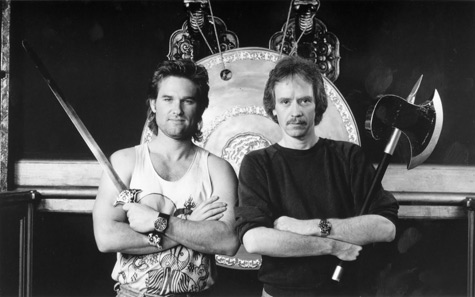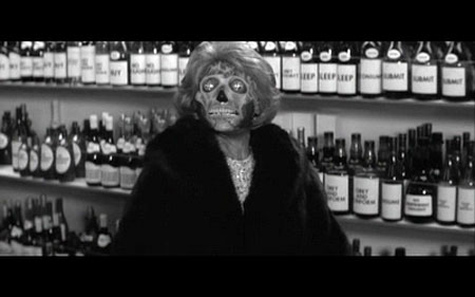 There was a time when I would have easily named John Carpenter as my favorite movie director. I’ve gained more pure visceral pleasure from his movies than almost anyone else's. He perfectly bridges the gap between classic Hollywood story sense and modern uncensored pleasures. Even as a teenager I got the sense Carpenter didn’t play by the old rules. He made movies that were FUN.
There was a time when I would have easily named John Carpenter as my favorite movie director. I’ve gained more pure visceral pleasure from his movies than almost anyone else's. He perfectly bridges the gap between classic Hollywood story sense and modern uncensored pleasures. Even as a teenager I got the sense Carpenter didn’t play by the old rules. He made movies that were FUN.
Was he the most technically proficient? Maybe not. Does it matter? Not a damn bit. He came out of the era that birthed film school darlings like Scorsese, Spielberg, DePalma, and Landis. Darlings of the film students, that is, not necessarily the professors who might not always like the down-in-the-marrow joys of such schlock as Jaws, Taxi Driver, Blow Out, or The Blues Brothers. But even more than those other directors, Carpenter embodied the then-popular auteur concept by writing, producing, directing and even scoring his early films. Despite this, he is rarely—until now—mentioned artistically among his peers of the era.
Carpenter’s early career was a brilliantly sustained period of pulp cinema to rival anyone since Anthony Mann made his string of film noirs. His breakout hit was Halloween, and the film that unfairly tagged him a horror director for the rest of his career. As perfect as a horror film gets, Halloween was, again, a bridge from the relatively tame scare films pre-Halloween to the post-Halloween rise of the slasher film, despite Carpenter’s tale not having all that much blood in it. (And of course buckets of blood had been spilled in the grindhouse for years, but Halloween also had the distinction of being a major hit.)
Taking a step back, the potential of Carpenter as a crime film director is evident in his cheap but brilliant Assault On Precinct 13, a film famous for not being set in Precinct 13. The producers decided the number 13 sounded better in the title. But Carpenter’s mastery of pace is on display from the get-go in his career. Often cited as an urban retelling of the Howard Hawks’s western Rio Bravo, Assault is typical of Carpenter’s deliberate style. A style often so unnerving in its suspense it caused legendary New York Times film critic Pauline Kael to make my favorite film review quote about Halloween. While taking a few knocks at the film Kael acknowledges Carpenter’s relentless stalking camera and repetitive score (which he wrote himself) and states, “you reach the point of wanting somebody to be killed so the film’s rhythms will change.”
Carpenter quickly embraced the name-above-the-title status after Halloween as heir apparent to Hitchcock, but as with Hitch, his success was limited to genre films. His follow up film, The Fog, is an effective horror outing, the best stuff coming in the early stages when the mysterious fog begins rolling in. Carpenter is often best in the wordless, pure cinema moments.
He worked as a prolific screenwriter of feature films and TV movies in the early days before he veered off into science fiction in ’81, writing and directing the classic Escape From New York. It was a few years earlier that he worked with Kurt Russell for the first time on a TV movie about Elvis, which is quite good and shows a different side of Carpenter, a side he never got to fully explore as director, but it is here that Carpenter and Russell begin a partnership as fruitful as Scorsese and DeNiro in the same era. Russell became his muse and someone perfectly attuned to Carpenter’s rhythms.
Escape From New York is pure pulp, a movie straight out of an adolescent mind. It’s just so damn cool and not trying to please anyone but the people making it. Aren’t all the best movies that way?

The two followed up with the now-classic retelling of The Thing, a favorite of Carpenter as a youth when he saw the Howard Hawks-produced version. The critics hated The Thing upon release, citing it as too extreme, too violent, too depraved. Fans embraced it for the same reasons and now, more than thirty years later, the skill and technical prowess of the filmmaking is finally being appreciated.
By turns funny and terrifying (and Carpenter knows as well as anyone in Hollywood history how to balance the two) The Thing is another of his unrelenting suspense classics. And that ending! All this time later I still don’t know he got away with it under a major studio’s watch.
What’s any renowned horror director without a Stephen King adaptation on his resume? Christine might not be the best King adaptation, but it is among the best. Anyone who can make a car scary deserves some credit. Here, in the early ’80s, Carpenter is on a great run of pure pleasure cinema. He might not have won any Oscars, but who cares? He made movies for the people in the seats, for hearts, not minds. And film lives on in the heart, it comes and goes from the mind.
Another film that shows tremendous potential seemingly denied him by Hollywood is Starman, his Spielbergian-level sentimental alien film. It doesn’t shock you, scare you, or gross you out. Carpenter is capable of so much more. In fact, he made Starman as a direct result of the beating The Thing took. He knew he needed a hit and to do something less shocking. But when a little alien movie called E.T. became the biggest movie of all time, Starman was shelved.
When it finally came out a few years later, the film did modest business, and was overshadowed by bigger genre films like Ghostbusters, Gremlins, The Terminator, and the second Indiana Jones film.
Carpenter retreated to the horror factory. Well, almost.
It might have been the film that did him in, but Big Trouble In Little China is one of those secret handshake films. The kind that if you like it, you’re in the club. Us vs. them. Those who get it and those who do not.
Rumor has it both Jack Nicholson and Clint Eastwood were considered for the part of Jack Burton, but Carpenter only wanted his pal Russell.
Again, this is Carpenter making a movie for the sheer joy of it. Perhaps he was spending a little Hollywood capital off his numerous successes. Perhaps he thought it would actually do well. All I know is I’m glad he and Russell teamed up again for a bizarro chop-socky action comedy that is minute-by-minute quotable and as odd a film to ever come out of a major studio. The studio didn’t know what to do with it.
Not surprising, it was a flop. Back to the grindhouse he goes. Carpenter’s retreat back to non-studio backed projects, like his start with Halloween, ended his high-end run of great films. He still managed some good ones though. For a while at least.
Both Prince Of Darkness and They Live survive on Carpenter’s gift for scares and laughs. They also both suffer from B-level casting, with ex-wrestler Roddy Piper a pale imitation in a role in They Live which obviously should have gone to Russell. Points to They Live for one of the all-time best fistfight scenes in cinema, though.

From there, things get rough. I hate to admit it. I went to see every Carpenter film opening weekend at the box office, knowing he had it in him, waiting for the same feeling of visceral pleasure those early films were filled with. Sadly, it was not to be.
I’m not here to bash any part of his career. He boldly kept slugging it out against a Hollywood that wanted to pigeonhole him, that kept his budgets low and his visions small. He should have directed a western. He should have made more crime films the way DePalma rebounded with The Untouchables. He should have had access to great scripts alongside the best of the genre film makers in Hollywood. Instead he churned out a list of credits with a diminishing return.
There are highlights. The Gas Station segment of the Showtime pilot-turned-one-off TV movie is a genuinely effective piece of suspense filmmaking.
He’s still at it. His latest direct-to-DVD offering, The Ward, is among his best in years. I despise myself for saying it, but his later career is as disappointing as his early career is great. I don’t blame Carpenter. He soldiered on.
I honestly wish he never got his name above the title. I wish he’d remained a journeyman director who cranked out the pulp cinema he loved so well. I wish he’d been able to explore different genres, different styles.
But we have his best work and the hope that maybe there is more yet to come.
Eric Beetner is the author of Dig Two Graves, Split Decision and A Mouth Full Of Blood, as well as co-author (with JB Kohl) of One Too Many Blows To The Head and Borrowed Trouble. His award-winning short stories have appeared in Pulp Ink, D*cked, Grimm Tales, Discount Noir, Off The Record, Murder In The Wind, Needle Magazine, Crimefactory, The Million Writers Award: Best New Online Voices and more. His newest novel, The Devil Doesn’t Want Me is available now. For more info visit ericbeetner.blogspot.com.
Read all posts by Eric Beetner for Criminal Element.

Superb piece about Carpenter. Well-stated career overview. He’s a director I feel very much the same way about as you do. After seeing Halloween when it came out, when I was 16, I would rush out as quickly as possible also soon as his next film opened. Of his later work, I have to say, I really like CIGARETTE BURNS, the one hour thing he did for the first season of Masters of Horror on Showtime. Thought that was really excellent, hearkening back to his early strong work. A terrific example of a small sub-genre where the story is about a fictional horror film which has deadly impact on audiences who see it. Anyway, despite the later disappoinments, at least the early work will always be there and kudos, as you say, to Carpenter for soldiering on.
I would have to call ESCAPE FROM NEW YORK the ultimate guy flick. It even beats out THE ROAD WARRIOR for the title.
Doesn’t anyone remember his first major studio film The Eyes of Laura Mars (1978)? Not even mentioned. Still a film worth viewing. A very young Tommy Lee Jones and the most sophisticated role for Dunaway as a high-fashion photographer in NYC. A terrific cast all around (watch it, you’ll be surprised who you see).
[url=http://www.imdb.com/name/nm0449984?ref_=tt_ov_dr]Irvin Kershner[/url] directed “The Eyes of Laura Mars,” Charlotte. John Carptenter was the screenwriter for that film.
Carpenter’s body of work stands with any modern director’s. “Escape from New York” is one of the greatest adventure films ever made, a perfect movie and his best imho. But he has at least a half-dozen excellent films. Even “Escape from L.A.,” taken on its own terms as a brutal poison pen love letter to Los Angeles, Hollywood, the film business and action movies, is brilliant. Never saw “Ghosts of Mars” or “The Ward,” the reviews just got too brutal, but I guess I should.